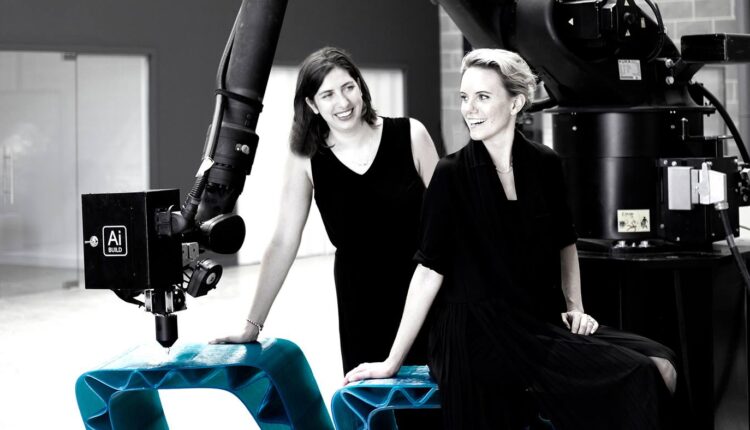
A unique way to sit down, thanks to KUKA robots and 3D printing
When KUKA robots create furniture, do they make carpenters redundant? Not quite. Instead, the 3D printed seat and bench modules TWINE – designed by HagenHinderdael in London – add something completely new to the worlds of furnishing, engineering and recycling.
HagenHinderdael is a design studio founded in 2020 by Sofia Hagen and Lisa Hinderdael, both architects as well as designers. “Our ethos is to celebrate long-established craftsmanship and always think about the lifecycle of the installations”, they state. Both love to work with local artisans and with cutting-edge technology to realise ideas collected around the globe – with Hinderdael coming from Belgium, Hagen being from Austria, and both having worked in international settings.
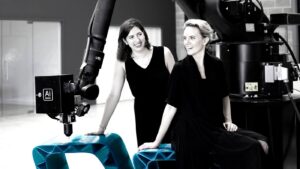
Production and development: Hospital waste as raw material
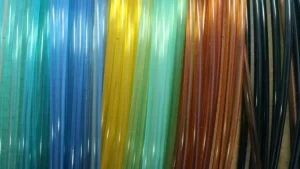
“We had the idea for TWINE when Rossana Orlandi launched her third Guiltless Plastic campaign”, Sofia Hagen reports. Orlandi, a famous gallerist from Milan, regularly invites artists and designers to showcase their projects to de-clutter the planet in a remarkable way. So HagenHinderdael invented TWINE. “We wanted our furniture to be playful, comfortable, durable, and we wanted to use filaments made by Reflow”, Sofia adds describing their creative ambition. Reflow is an award-winning Amsterdam-based social enterprise which produces high-quality, sustainable 3D printing material, the so-called filaments, out of recycled plastic waste. TWINE’s raw material, rPETG filament, stems from former hospital trays.
An idea in 3D convinces
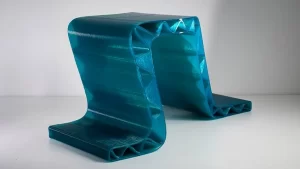
Each TWINE module is 1.06 meter long and 50 centimetres high, with varying widths of 30 or 45 centimetres. So you can sit down by yourself or with your family and friends. Rossana Orlandi loved the idea for this project when it was still a draft, and TWINE became a finalist for the RO PlasticPrize 2021. Whoever wins this award for objects out of recycled plastic makes the headlines all over Europe. Therefore, the TWINE seat was sent to Milan for the feature showcase.
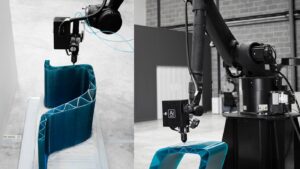
Knows the material: Ai Build as an experienced partner
Durability and aesthetics should be guaranteed – without human intervention
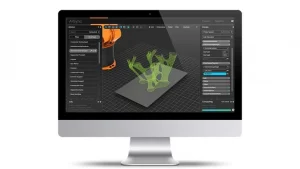
Creating pieces for an exhibition in Milan was something exciting and new to Ai Build. According to Desyllas, “the biggest challenge for this particular project was the geometry of the parts and the desired aesthetic finish. This meant that no support was allowed”. The 3D printing should deliver perfect-enough modules, man shouldn’t interfere. Ai Build decided that a KR30 L16 (KR IONTEC series) and a KR90 R2700 (KR QUANTEC series) should do the job, “because these robots have the reach to allow the production of these parts. They are also fully integrated with our software which allows us to perform real-time monitoring of quality and get defect notifications”, says Desyllas.
Two KUKA robots enable diversity in 3D
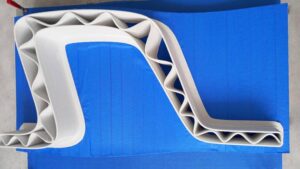
It took less than two weeks from the order to the finished furniture. Since TWINE was meant to look as natural as beach waves, Ai Build constructed a mould shaped to a double-curved bed, for the 3D printed mix to cool down and harden. The smaller elements were created by the KR30 L16, the wider ones by the KR90 R2700, both equipped with a filament extruder system. This system can carry up to four varying filament streams in different colours, enabling a gradient of transparencies.
Additive manufacturing: The importance of timing
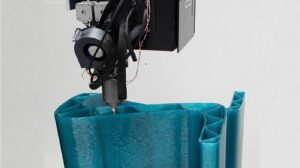
Created for travelling the world
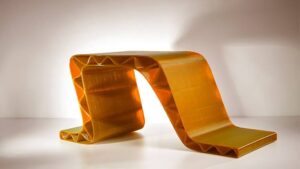
Though TWINE didn’t win the RO PlasticPrize, its journey has just begun. At the end of September, it became part of the design show “Planted” during this year’s London Design Festival. In March 2022, TWINE will be shown at the Vorarlberger Architektur Institut in Austria. HagenHinderdael are ready to customize and produce TWINE arrangements for arts lovers and corporate clients all over the world now, knowing Ai Build and their KUKA robots can be relied on. The new TWINE elements can be customised and will be printed by the Italian KUKA partner Caracol-AM. “They will produce the furniture with our software, and Ai Build will test each new product in cooperation with them”, Michail Desyllas states. And behind all of this, there’s the idea of Lisa Hinderdael and Sofia Hagen to bring new life to hospital waste and show plastic as beautiful as can be.
KUKA have been our partner from the start. With the range of robots they have, they allowed us to scale up. The reliability and accuracy of KUKA robots is critical for large-format 3D printing.
This content was first published on the KUKA website.
